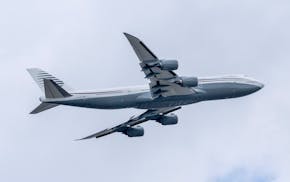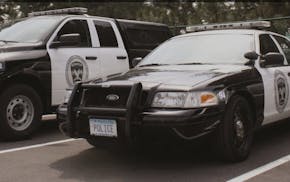Sitting in the back of a tactical vehicle on the way to training for the U.S. Army's Special Forces, Sgt. Isaac Schneider told a fellow soldier he was thinking of taking on a career as a physician's assistant when his military career was over.
"If you're gonna be a bear, be a grizzly bear," his friend responded. "Why not be a physician?"
A career in medicine was something Schneider knew he wanted after serving for years as a medical sergeant after joining the Montana National Guard in 2006, including during a deployment to Iraq. But goals of becoming an actual doctor struck him as lofty.
Still, Schneider took his medical college acceptance test (MCAT) and applied to several medical schools before he learned about a new University of Minnesota program helping veterans with combat medical experience transition to medical school. He was accepted, and is on the road to becoming a doctor.
Military Medic to Medical School, also known as MM2MS, started like any good idea: Over drinks in a hotel bar, the program's director Chris vanBrenk said, laughing.
VanBrenk, a former Army Special Forces commander and a project manager for the Global Surgical and Medical Support Group (GSMSG), was stationed in Ukraine at the start of Russia-Ukraine war when he met Dr. Greg Beilman.
Trauma surgeons were visiting Ukraine through the American College of Surgeons in partnership with GSMSG to teach and help perform surgeries. Beilman was one of those surgeons.
"I was talking to Greg and we were all chatting and I was like, 'You know, wouldn't it be nice if there was a dedicated way to help get veteran medics into medical school?'" vanBrenk said.
VanBrenk didn't think much of the conversation until he received a phone call from Beilman nearly a year later asking him to run the program.
MM2MS officially started the fall semester of 2024. It's a year-long seminar program that mentors and assists combat medics in preparation for medical school.
Every candidate in the MM2MS program is guaranteed a slot at the U's Medical School. Up to five medical school slots are reserved for the program.
For the 2024-25 academic year, three candidates were accepted into the program, including Schneider.
Sarah Loudon, another MM2MS candidate, worked as a solar energy engineer before she joined the military to be a combat medic. She followed in the footsteps of her father and grandfather, both pilots in Vietnam and World War II, respectively.
Loudon served on the local Air Force Reserve unit for 12 years, transporting wounded military members over long distances and on international flights to receive more advanced medical care.
"That was an honor to be able to kind of follow in that path in a small way," Loudon said. "This was both a chance to serve in the country and a chance to get some hands-on training and service in the medical field."
She was already taking prerequisite courses at the U in preparation to become a physician's assistant when she learned about MM2MS.
"I had the aspiration to go to medical school, but just was really concerned that my academic track record just was so start-and-stop and that it just would be a real uphill climb," Loudon said.
"I thought that the PA track would be a still really great opportunity. But I saw [MM2MS]," Loudon said. "I thought 'Well, I would be be foolish not to try.'"
Taylor Ritchot set her sights on becoming a doctor after she witnessed a drowning as a young teenager.
"In that moment, I felt really, really guilty that I couldn't jump in and help this person who was in need," Ritchot said.
She became a lifeguard at 16, then an emergency medical responder a year later before joining the Minnesota National Guard as a combat medic in 2018. She now works as an emergency room nurse at M Health Fairview while prepping for her MCAT and finishing her medical school prerequisite courses.
"I grew up always wanting to be a doctor," Ritchot said. "When I joined the military, I kind of lost hope of that dream being reality and kind of lost a lot of my confidence."
Ritchot said that changed when she was deployed to Kuwait in 2021 to assist with the U.S. military's withdrawal from Afghanistan. With limited resources and a language barrier, she treated patients of all ages with different medical needs.
"That exposure really gave me a lot of confidence," Ritchot said. "So then when I had the opportunity to apply for medical school, to apply for this program, it just felt too good to be true."
Ritchot will start medical school in 2026. Loudon and Schneider will start in August.
VanBrenk said the three epitomize the goal of the program — to empower veterans with medical experience to further their careers, to the benefit of everyone.
"When I close my eyes at night and wonder, what would I want in a future doctor? That's what I would want. I would want people like Isaac, Sarah and Taylor," vanBrenk said.
Canoer whose body was found in Boundary Waters ID'd as Twin Cities man

Trump defends the prospect of Qatar gifting him a plane to use as Air Force One

Air quality alert issued for Twin Cities, central and western Minnesota on Monday
Residents evacuated, structures damaged as wildfire rapidly spreads Sunday in St. Louis County

